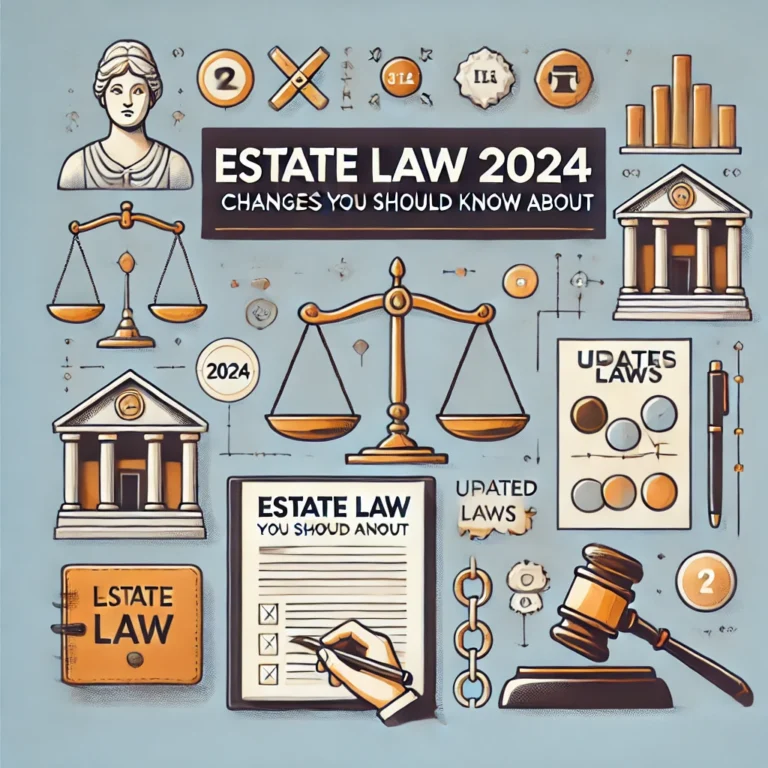How Estate Law Works: What to Expect in the Estate Planning Process
Estate planning might seem like a daunting and complex process, but it doesn’t have to be. The idea of planning for what happens to your assets after your death isn’t the most exciting topic, but it is one of the most important steps you can take to ensure your family’s future. Whether you’re leaving behind a sprawling estate or just a few personal belongings, estate planning gives you peace of mind and control over what happens next.
In this guide, we’ll break down everything you need to know about estate law and what to expect during the estate planning process. From understanding what estate law entails to walking you through the key steps of creating a plan, we’ve got you covered.
What Is Estate Law?
Estate law, in its simplest form, governs how a person’s property and assets are distributed after they die. It also deals with legal matters like guardianship for minor children, medical directives, and even setting up trusts for loved ones. Think of it as a roadmap for your belongings, ensuring everything gets where it needs to go when you’re no longer around to manage it.
Why Is Estate Planning Important?
Estate planning isn’t just for the wealthy. Whether you own a mansion or a modest home, having a plan ensures that your wishes are respected after your passing. Without a solid estate plan, the court will decide how your assets are divided, which could lead to unwanted outcomes or family disputes. Proper estate planning also helps minimize estate taxes, avoid probate, and ensure your loved ones are taken care of.
Who Needs Estate Planning?
Pretty much everyone! Regardless of your financial situation, if you have assets, dependents, or specific wishes about your medical care, an estate plan is crucial. Here’s a quick breakdown of people who benefit most from estate planning:
- Parents with young children: To name guardians and set up financial support.
- Homeowners: To ensure your property goes to the right person.
- Business owners: To ensure a smooth transition of ownership.
- People with significant assets: To minimize estate taxes and ensure equitable distribution.
Key Components of Estate Planning
An estate plan isn’t just about writing a will. There are several key components to consider, each addressing different aspects of your estate. Let’s walk through the most common parts:
1. Will or Last Testament
A will is the backbone of any estate plan. It’s a legal document where you state how you want your assets distributed, name guardians for any minor children, and appoint an executor to manage your estate.
2. Trusts
Trusts are another way to manage your assets and can offer greater control and flexibility than a will. You can set up a trust to distribute assets during your life or after your death. There are different types, like living trusts or irrevocable trusts, each with its own advantages.
3. Power of Attorney
A power of attorney grants someone you trust the legal authority to make decisions on your behalf if you become incapacitated. This can include managing financial matters, signing documents, and even making medical decisions.
4. Healthcare Directives
These are specific instructions about the type of medical care you wish to receive if you cannot communicate your preferences. They ensure your healthcare decisions align with your values and beliefs.
5. Beneficiary Designations
Certain assets, like life insurance policies or retirement accounts, allow you to designate beneficiaries. These assets often pass directly to the beneficiary without having to go through probate.
How Estate Law Works in the U.S.
Estate law can vary significantly from one state to another, but there are federal laws that apply as well, particularly when it comes to estate taxes. Understanding how the legal system handles estate distribution is important, especially when creating a plan that minimizes taxes and avoids probate where possible.
1. Probate
Probate is the legal process of verifying a will and distributing an estate. It can be time-consuming and costly, so many people try to structure their estate plans in a way that avoids probate. Having a living trust is one way to bypass this process.
2. Estate Taxes
Depending on the size of your estate, you might owe estate taxes, both at the federal and state levels. The federal estate tax only applies to estates exceeding $12.92 million (as of 2023), but some states have lower thresholds.
3. Intestate Succession
If someone dies without a will, they are said to have died “intestate,” and the state will determine how their assets are distributed. This process often prioritizes spouses, children, and close relatives, but it can become complicated if the deceased had complex relationships or no immediate family.
Steps in the Estate Planning Process

Now that you understand what estate law involves, let’s get into the step-by-step process of creating an estate plan.
Step 1: Assess Your Assets
The first step in estate planning is taking stock of what you own. This includes:
- Real estate
- Bank accounts
- Investments
- Life insurance policies
- Personal property like cars, jewelry, or heirlooms
It’s also important to assess any liabilities, like outstanding debts or mortgages.
Step 2: Determine Your Wishes
Once you know what you have, it’s time to think about who gets what. Do you want to leave specific items to certain people? Should everything be divided equally? Make sure to consider all aspects, including sentimental items, not just financial ones.
Step 3: Choose an Executor
The executor is the person responsible for carrying out your wishes after your death. Choose someone you trust, and make sure they’re willing to take on the responsibility. This can be a family member, a close friend, or even a professional, like a lawyer or accountant.
Step 4: Name Guardians for Minor Children
If you have young children, it’s crucial to name a guardian who will care for them if something happens to you. You should discuss this decision with the person you’re considering to make sure they’re up for the task.
Step 5: Draft Your Will
Now that you’ve done the legwork, it’s time to put your wishes into writing. You can either hire an estate attorney or use online tools to draft your will, but make sure it complies with the laws in your state.
Step 6: Set Up Trusts if Necessary
If you have more complex needs, like setting aside money for a child’s education or managing a large estate, setting up a trust can provide additional control and protection.
Step 7: Plan for Medical Decisions
Create healthcare directives that outline your wishes for end-of-life care. This could include specifying whether you want life-sustaining treatments or if you’d prefer to avoid extraordinary measures.
Step 8: Keep Everything Up to Date
Estate planning isn’t a one-and-done process. As your life changes, so should your estate plan. Major life events like marriage, divorce, the birth of a child, or the purchase of a new home should trigger a review of your estate documents.
Common Mistakes in Estate Planning
Even with the best intentions, estate planning mistakes can happen. Here are some common pitfalls to avoid:
1. Failing to Update Your Plan
Life changes, and so should your estate plan. Failing to update your will after major events can lead to unintended consequences.
2. Not Naming Contingent Beneficiaries
If your primary beneficiary dies before you, having a contingent beneficiary ensures your assets go where you intend.
3. Not Planning for Incapacity
Many people forget to plan for the possibility of becoming incapacitated. Having a power of attorney and healthcare directives in place ensures your affairs will be handled the way you want if you’re unable to make decisions.
Benefits of Hiring an Estate Attorney
While it’s possible to create an estate plan on your own, hiring an estate attorney has several benefits. An experienced lawyer can help navigate complicated legal questions, ensure that your documents comply with state laws, and provide peace of mind that everything is handled correctly.
When Should You Start Estate Planning?
The best time to start estate planning is right now. While none of us like to think about our mortality, having a plan in place offers peace of mind, knowing that your wishes will be honored and your loved ones taken care of.
Conclusion
Estate planning is about more than just dividing up assets; it’s about protecting your legacy, ensuring the well-being of your loved ones, and giving yourself peace of mind. By understanding how estate law works and taking the necessary steps to create a comprehensive estate plan, you’ll be better prepared for the future. Remember, estate planning isn’t something you do for yourself – it’s something you do for those you care about most.
FAQs
1. What happens if I die without a will?
If you die without a will, the state will determine how your assets are distributed through a process called intestate succession. This can lead to results you may not have wanted, like assets going to relatives you’re not close to.
2. Can I write my own will without a lawyer?
Yes, you can draft your own will, but it’s often better to have a lawyer review it to ensure it complies with state laws and that your wishes are clearly documented.
3. What’s the difference between a will and a trust?
A will is a document that outlines how your assets should be distributed after your death, while a trust is a legal arrangement where assets are held and managed by a trustee for the benefit of beneficiaries.
4. How often should I update my estate plan?
You should review and update your estate plan whenever you experience a major life event, such as marriage, divorce, the birth of a child, or the acquisition of significant assets.






